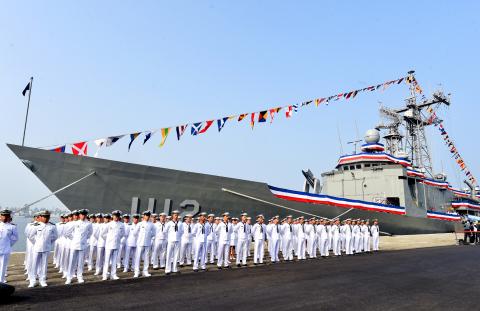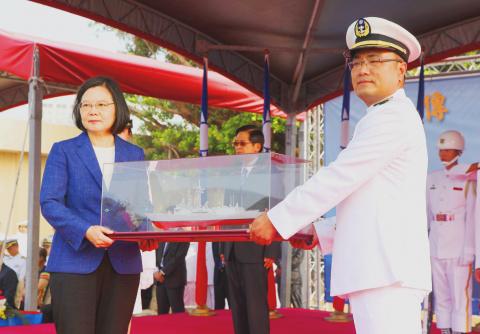President Tsai Ing-wen (蔡英文) yesterday vowed that the nation would not “concede one step” in defending itself as she inaugurated two frigates purchased from the US.
The two Perry-class guided missile frigates were commissioned in a ceremony at the Zuoying naval base in Kaohsiung.
Built in the 1980s, the frigates were originally named USS Taylor and USS Gary, and were part of a US$1.8 billion arms deal to Taiwan announced in 2015 under then-US president Barack Obama. They have been renamed Ming Chuan (銘傳) and Feng Chia (逢甲).

Photo: Chien Jung-fong, Taipei Times
They have “high mobility, high sea resistance and low noise,” and are fitted with the SQR-19 sonar system currently used by the US Navy, the Republic of China Navy said.
The ships are to patrol the Taiwan Strait, it added.
Navy Chief of Staff Vice Admiral Lee Tsung-hsiao (李宗孝) had previously said that the warships’ anti-submarine capabilities are more advanced than the nation’s eight Cheng Kung-class frigates and could have a “deterrent effect” against Chinese submarines.

Photo: Chien Jung-fong, Taipei Times
“We want to send a clear and firm message from Taiwanese to the international community that we will not concede one step in defending ... Taiwan and protecting our free and democratic way of life,” Tsai said after inspecting the ships.
Beijing’s “military actions in the region not only attempt to weaken Taiwan’s sovereignty, but also damage regional peace and stability,” Tsai said.
She highlighted the unconventional “three warfare” threats from the Chinese People’s Liberation Army: psychological, public opinion and legal warfare.
The global security situation is undergoing rapid change and the nation is facing a new array of security challenges, including China’s military exercises near the nation’s periphery, she said.
Beijing deploys conventional and unconventional military methods against Taiwan, including leveraging information technology, the Internet and new media to flood Taiwan with disinformation, she said.
Incessant cyberattacks on the nation’s government and enterprises are a national security threat that Taiwan must confront by self-strengthening — its unchanging principle to protect its place in the world, she said.
“It is my solemn hope that the armed forces will follow three noes: no forgetting the mission to defend Taiwan, no giving up on safeguarding regional peace and stability, and no forgetting the threat of foreign forces,” she said.
The American Institute in Taiwan (AIT) in a news release said that the sale of the warships contributes to the military balance in the Indo-Pacific region.
“This sale is consistent with US commitments under the Taiwan Relations Act to provide military articles that support Taiwan’s self-defense,” the institute said.
The frigates “will improve Taiwan’s capability in current and future defensive efforts, and further Taiwan’s continuing work to modernize its armed forces,” it said.
The AIT said it sent representatives to yesterday’s ceremony, including AIT Kaohsiung head Matthew O’Connor and members of the AIT team “to signify our enduring support to Taiwan’s defense under the provisions of the Taiwan Relations Act of 1979.”

CLASH OF WORDS: While China’s foreign minister insisted the US play a constructive role with China, Rubio stressed Washington’s commitment to its allies in the region The Ministry of Foreign Affairs (MOFA) yesterday affirmed and welcomed US Secretary of State Marco Rubio statements expressing the US’ “serious concern over China’s coercive actions against Taiwan” and aggressive behavior in the South China Sea, in a telephone call with his Chinese counterpart. The ministry in a news release yesterday also said that the Chinese Ministry of Foreign Affairs had stated many fallacies about Taiwan in the call. “We solemnly emphasize again that our country and the People’s Republic of China are not subordinate to each other, and it has been an objective fact for a long time, as well as

‘CHARM OFFENSIVE’: Beijing has been sending senior Chinese officials to Okinawa as part of efforts to influence public opinion against the US, the ‘Telegraph’ reported Beijing is believed to be sowing divisions in Japan’s Okinawa Prefecture to better facilitate an invasion of Taiwan, British newspaper the Telegraph reported on Saturday. Less than 750km from Taiwan, Okinawa hosts nearly 30,000 US troops who would likely “play a pivotal role should Beijing order the invasion of Taiwan,” it wrote. To prevent US intervention in an invasion, China is carrying out a “silent invasion” of Okinawa by stoking the flames of discontent among locals toward the US presence in the prefecture, it said. Beijing is also allegedly funding separatists in the region, including Chosuke Yara, the head of the Ryukyu Independence

‘ARMED GROUP’: Two defendants used Chinese funds to form the ‘Republic of China Taiwan Military Government,’ posing a threat to national security, prosecutors said A retired lieutenant general has been charged after using funds from China to recruit military personnel for an “armed” group that would assist invading Chinese forces, prosecutors said yesterday. The retired officer, Kao An-kuo (高安國), was among six people indicted for contravening the National Security Act (國家安全法), the High Prosecutors’ Office said in a statement. The group visited China multiple times, separately and together, from 2018 to last year, where they met Chinese military intelligence personnel for instructions and funding “to initiate and develop organizations for China,” prosecutors said. Their actions posed a “serious threat” to “national security and social stability,” the statement

NATURAL INTERRUPTION: As cables deteriorate, core wires snap in progression along the cable, which does not happen if they are hit by an anchor, an official said Chunghwa Telecom Co (中華電信) immediately switched to a microwave backup system to maintain communications between Taiwan proper and Lienchiang County (Matsu) after two undersea cables malfunctioned due to natural deterioration, the Ministry of Digital Affairs told an emergency news conference yesterday morning. Two submarine cables connecting Taiwan proper and the outlying county — the No. 2 and No. 3 Taiwan-Matsu cables — were disconnected early yesterday morning and on Wednesday last week respectively, the nation’s largest telecom said. “After receiving the report that the No. 2 cable had failed, the ministry asked Chunghwa Telecom to immediately activate a microwave backup system, with